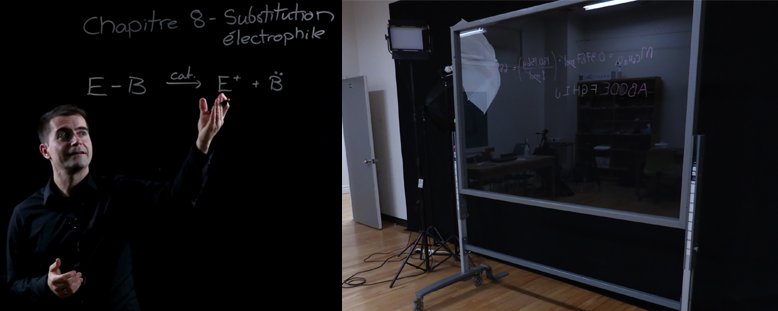The Proliferation of Video at the Séminaire de Sherbrooke
Thanks to a grant in the context of the Digital Action Plan, video is quickly becoming an integral part of the pedagogical practices of college teachers at the Séminaire de Sherbrooke. Used as part of a flipped teaching approaches or to supplement notions seen in class, videos are distributed through Microsoft Stream channels tied in with the Microsoft Teams accounts of several teachers. Here are some examples.
Several Video-Related Projects at the Séminaire
Video is now part of our daily lives. It is built into our mobile devices, making it the experience very user-friendly. It has become so accessible that the support of computer technicians is practically no longer necessary to create video material. We use video to communicate our experiences by publishing them on social media or to meet in digital spaces, such as videoconferences and distance learning classes.
At the Séminaire de Sherbrooke, video serves teaching. Whether it is to support the accessibility of course content for students or to maintain engagement with their teachers, even when videos are viewed asynchronously, the Seminary’s video projects respond to a variety of needs. The disciplines in which projects took shape in autumn 2019 are:
- English
- Architecture
- Science
Video-Based Reference Material for English Courses
For the purpose of our English courses, a teacher quickly learned the basics of video production with TechSmith’s Camtasia software. The purpose of the video content produced is to teach learners in a fun way the basics of referencing and citation in an English text. Over the course of different semesters, the English teacher had to constantly revisit the good practices of quotations and referencing. The video, integrated into a Stream channel in an Office 365 Teams account, becomes a reference on the best referencing practices for all students taking English classes at the Séminaire de Sherbrooke.
Video As Part of a Hybrid Course in Architectural Technology
In Architectural Technology, a teacher has adopted hybrid pedagogy. Knowing that she had to be absent for health reasons, she could not continue her course in the classroom. Therefore, she recorded the last 5 classes of the fall 2019 semester, giving asynchronous access to the concepts planned in the syllabus to her students. She answered questions from students remotely through the communication channels of Microsoft Office 365 (Outlook, Skype, Forum).
A Recording Studio for Science Teachers
In Science, video recordings using the Lightboard technique are bound to stimulate the students’ ideation abilities. At the Séminaire de Sherbrooke, the team of support staff regularly performs miracles. In just two weeks, they transformed an old blackboard into a Lightboard.
Adjustable and oversized, this transparent board now allows students to follow the evolution of chemical formulas without losing contact with the face of the teacher. Nonverbal communication emphasizes the verbal communication of the teacher, thus supporting learning. This singular technique (Lightboard) mystifies students, who regularly stop to question the special effects department (the technopedagogical studio).
At theSéminaire, digital video recordings gather more and more followers. They allow innovative pedagogies aligned with the objectives of the Digital Action Plan. The college-level team at the Séminaire integrates digital realities that evolve at a dizzying pace (digital learning environments, virtual reality, augmented reality). At this rate, it would not be surprising if the teaching team at Séminaire de Sherbrooke leaves the real world and reaches new horizons in a virtual world.
Presentation of video-related projects at Séminaire de Sherbrooke



